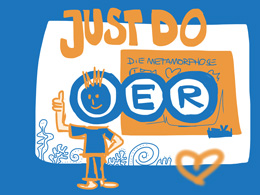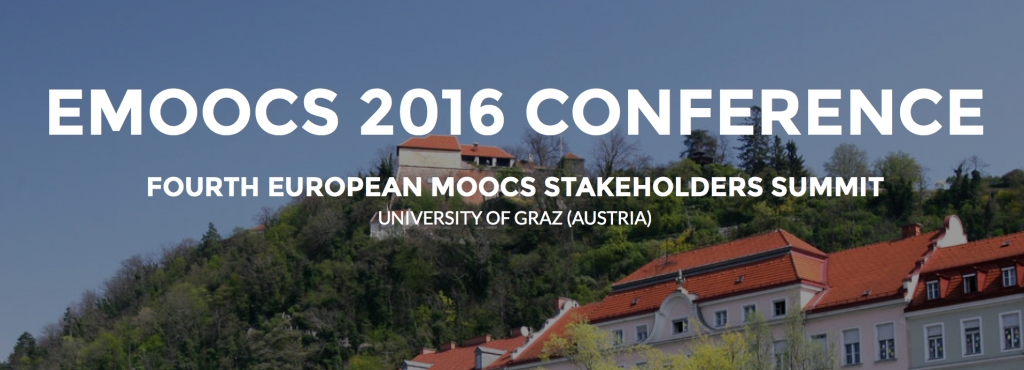Im Vorfeld der Welcome Days freut es uns besonders, dass wir unsere zukünftigen Studierenden bereits bei der Voranmeldung unterstützen können. In einem Kurzvideo werden die ersten Schritte an der TU Graz vorgestellt und beschrieben. Sollte es Probleme geben, freut es uns auch diese beantworten zu können (e-mail).
[publication] MOOCs as granular systems: design patterns to foster participant activity
Our publication about “MOOCs as granular systems: design patterns to foster participant activity” is now published as part of the new eLearning papers issue.
Abstract:
MOOCs often suffer from high drop-out and low completion rates. At the beginning of the course, the audience is indeed “massive”; thousands of people wait for the course to begin, but in the end only a low number of participants stay active and complete the course. This paper answers the research question “Is there a specific point during an xMOOC where learners decide to drop out of the course or to become lurkers?” by identifying MOOCs as a challenging learning setting with a “drop-out problem” and a decrease in participant activity after the fourth to fifth course week. These are the first results of a Learning Analytics view on participant activity within three Austrian MOOCs. This “drop-out point” led the paper to introduce a design pattern or strategy to overcome the “drop-out point”: “Think granular!” can be seen as an instructional design claim for MOOCs in order to keep participant activity and motivation high, and that results in three design patterns: four-week MOOCs, granular certificates and suspense peak narratives
Reference: Lackner, E., Ebner, M., Khalil, M. (2015) MOOCs as granular systems: design patterns to foster participant activity, eLearning Papers, 42 (2015), pp. 28-37
[coer, imoox] OER an Schule und Hochschule #coer15 #imoox
 Der MOOC zu Open Educational Resources – kurz coer15 – geht (leider) schon in die sechste und damit letzte Woche. Diesesmal ist das Thema OER an Schulen und Hochschulen. Dazu haben wir versucht einige sehr erfahrene Personen zu bitten uns ihre Sichtweisen, Erfahrungen und Beispiele zu nennen. Freuen Sie sich sich mit mir auf Sandra Schön, Ricarda Reimer, Christian Hoppe, Hannes Rothe, das Schulbuch-O-Mat-Team Hans und Heiko und last but not least auch noch Jöran Muuß-Meerholz. Besser geht es aus meiner Sicht fast gar nicht 🙂
Der MOOC zu Open Educational Resources – kurz coer15 – geht (leider) schon in die sechste und damit letzte Woche. Diesesmal ist das Thema OER an Schulen und Hochschulen. Dazu haben wir versucht einige sehr erfahrene Personen zu bitten uns ihre Sichtweisen, Erfahrungen und Beispiele zu nennen. Freuen Sie sich sich mit mir auf Sandra Schön, Ricarda Reimer, Christian Hoppe, Hannes Rothe, das Schulbuch-O-Mat-Team Hans und Heiko und last but not least auch noch Jöran Muuß-Meerholz. Besser geht es aus meiner Sicht fast gar nicht 🙂
Also schnell anmelden, der Einstieg ist noch jederzeit möglich.
[presentation] All About MOOCs #imoox
Im Rahmen der 13. uDays an der FH Vorarlberg stellte ich unsere ersten Evalutionsergebnisse von iMooX vor. Mit dem Titel “All About MOOCs” gibt es Zahlen, Fakten und vielleicht auch neue Erkenntnisse rund um diese Form der Online-Kurse. Hier einmal die Folien:
Klicken Sie auf den unteren Button, um den Inhalt von de.slideshare.net zu laden.
[imoox] Maker-MOOC ab Herbst bei #imoox
Making! Der kostenlose Online-Kurs zum kreativen digitalen Gestalten mit Kindern und Jugendlichen! – Er richtet sich an PädagogInnen, die neugierig sind, aber selbst noch nichts oder nur wenig ausprobiert haben und beginnt am 19. Oktober 2015. Wir freuen uns auch über alle ExpertInnen, die während des Kurses zu den einzelnen Themen Teilnehmer/Innenfragen (im Forum) betreuen bzw. moderieren möchten. Oder parallel zum Kurs eine Präsenzveranstaltung anbieten, bei der ausprobiert werden kann? Bitte melden bei: sandra.schoen@l3t.eu
[Anmeldungen zum MOOC ab sofort bei iMooX möglich]
[presentation] Eine Feldstudie zum Einsatz von Learning-Analytics-Applikationen in der Mathematik
Im Rahmen seiner Masterarbeit hat sich Matthias um den Einsatz unserer Mathematikapplikationen im Unterricht bemüht. Das Ergebnis mit dem Titel “Learning Analytics-Eine Feldstudie zum Einsatz von Learning-Analytics-Applikationen in der Mathematik” hat er mit diesen Folien erfolgreich präsentiert:
Klicken Sie auf den unteren Button, um den Inhalt von de.slideshare.net zu laden.
[publication] Visualizing Collaborations and Online Social Interactions at Scientific Conferences for Scholarly Networking
Our publication about “Visualizing Collaborations and Online Social Interactions at Scientific Conferences for Scholarly Networking” at this year World Wide Web Conference is now online available.
Abstract:
The various ways of interacting with social media, web collaboration tools, co-authorship and citation networks for scientific and research purposes remain distinct. In this paper, we propose a solution to align such information. We particularly developed an exploratory visualization of research networks. The result is a scholar centered, multi-perspective view of conferences and people based on their collaborations and online interactions. We measured the relevance and user acceptance of this type of interactive visualization. Preliminary results indicate a high precision both for recognized people and conferences. The majority in a group of test-users responded positively to a set of statements about the acceptance.
Reference: De Vocht, L.; Selver, S.; Anastasia, D.; Verborgh, R. .; Mannens, E.; Ebner, M.; Van de Walle, R. (2015) Visualizing Collaborations and Online Social Interactions at Scientific Conferences for Scholarly Networking. – in: WWW 2015 Companion (2015), pp. 1053 – 1054, International World Wide Web Conference
[coer, imoox] Finanzierung von OER #coer15 #imoox
 Der MOOC zu Open Educational Resources – kurz coer15 – ist in der Woche 5 angelangt. Diesesmal dreht es sich ums Geld, denn wenn auch die Materialien frei zugänglich sind, heißt das ja nicht, dass sie auch ohne Kosten erstellt werden. Mit anderen Worten: “Wie man soll man denn das alles finanzieren?”. Das Businessmodell, das es so eigentlich noch gar nicht gibt, steht also im Zentrum dieser Woche. Ich selbst versuche, dabei die Möglichkeiten darzustellen und zeige was wohl machbar ist.
Der MOOC zu Open Educational Resources – kurz coer15 – ist in der Woche 5 angelangt. Diesesmal dreht es sich ums Geld, denn wenn auch die Materialien frei zugänglich sind, heißt das ja nicht, dass sie auch ohne Kosten erstellt werden. Mit anderen Worten: “Wie man soll man denn das alles finanzieren?”. Das Businessmodell, das es so eigentlich noch gar nicht gibt, steht also im Zentrum dieser Woche. Ich selbst versuche, dabei die Möglichkeiten darzustellen und zeige was wohl machbar ist.
Also schnell anmelden, der Einstieg ist noch jederzeit möglich.
[conference] eMOOCs 2016 #emoos2016
 We would like to invite you to the eMOOCs conference 2016, which will be from 22nd to 24th of February 2016. It will be hosted in cooperationy by the University of Graz and the University of Technology Graz.
We would like to invite you to the eMOOCs conference 2016, which will be from 22nd to 24th of February 2016. It will be hosted in cooperationy by the University of Graz and the University of Technology Graz.
The official website is already online and the Call for Paper will follow in the end of june. You are warmly welcomed to a beautiful place as well as a great event – stay tuned.
[publication] COLINDA: Modeling, Representing and Using Scientific Events in the Web of Data
Our publicaton about “COLINDA: Modeling, Representing and Using Scientific Events in the Web of Data” at this year “DeRiVE 2015-Detection, Representation, and Exploitation of Events in the Semantic Web” conference is now online available.
Abstract:
Conference Linked Data (COLINDA)3, a recent addition to the LOD (Linked Open Data) Cloud4, exposes information about scientific events (confer- ences and workshops) for the period from 2002 up to 2015. Beside title, descrip- tion and time COLINDA includes venue information of scientific events which is interlinked with Linked Data sets of GeoNames5, and DBPedia6. Additionally in- formation about events is enhanced with links to corresponding proceedings from DBLP (L3S)7 and Semantic Web Dog Food 8 repositories. The main sources of COLINDA are WikiCfP9 and Eventseer10. The research questions addressed by this work in particular are: how scientific events can be extracted and summa- rized from the Web, how to model them in Semantic Web to be useful for mining and adapting of research related social media content in particular micro blogs, and finally how they can be interlinked with other scientific information from the Linked Data Cloud to be used as base for explorative search for researchers
Reference: Softic, S., de Vocht, L., Mannens, E., Ebner, M., Van de Walle, R. (2015) COLINDA: Modeling, Representing and Using Scientific Events in the Web of Data, In: Proceedings of the 4th International Workshop on Detection, Representation, and Exploitation of Events in the Semantic Web (DeRiVE 2015), van Erp, M., Troncy, R., Rospocher, M., van Hage, W. R., Shamma, D. A. (Ed.), pp. 12-23


